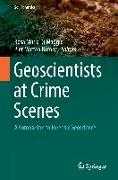Geoscientists at Crime Scenes
BücherAngebote / Angebote:
After the publication of the first Italian book on Forensic Geoscience: “Geologia Forense” (Di Maggio, Barone, et al. 2013, Flaccovio Ed.), the international demand to have an International version (in English language) about the new applications of this topic carried out in Italy and the possibility to apply them in international contexts encouraged us to create a new English book based on this. If forensic science is the application of technical and scientific methodologies applied to traditional categories of judicial investigations, in connection with the investigation of a crime or a social behavior, within them a special role is held by forensic geoscience, or the application of different disciplines of Earth Sciences in judicial contexts. Forensic geoscience encompasses some branches of the earth sciences such as geology, mineralogy, geochemistry, geophysics, remote sensing, soil science and archaeology, whose applications may provide a suitable or appropriate environmental interpretation of the surroundings, in the context of numerous types of offences, both criminal and civil. The environmental context can become part of the crime narrative in diverse situations: it can be the place where to hide a body or precious objects, or it may be a witness to a crime. Given the nature of many crime narratives carried out in outdoor areas, the environment, as it is not a closed system, plays a dual role, passive and active. Passive in the sense that it may be the principal repository of clues and evidence that both the victim and/or offender may have been present in a given location. Active since it can be the protagonist of the crime narrative, where, for example, it may have been abused in the design and construction phases of landfill or architectural structures, but also when it leaves proof marks on clothing and objects, such as the soil found on footwear. Police and other law enforcement organization are increasingly becoming more dependent on the expertise that can be provided by forensic geoscience. As such, forensic geoscientists are therefore likely to continue in the years ahead providing an important role assisting with certain types of criminal investigations. It is therefore expected that this book will be of value to forensic geologists, forensic archaeologists, forensic scientists, environmental scientists, geophysicists, geomorphologists, police officers, law enforcement officers and students. Accordingly, Geoscientist at Crime Scenes provides information and a valuable collection of cases that are relevant for the professional and practicable applications of geoscience to policing and law enforcement. This book should be in the collection of every forensic geo-scientist throughout the world.
Folgt in ca. 10 Arbeitstagen




